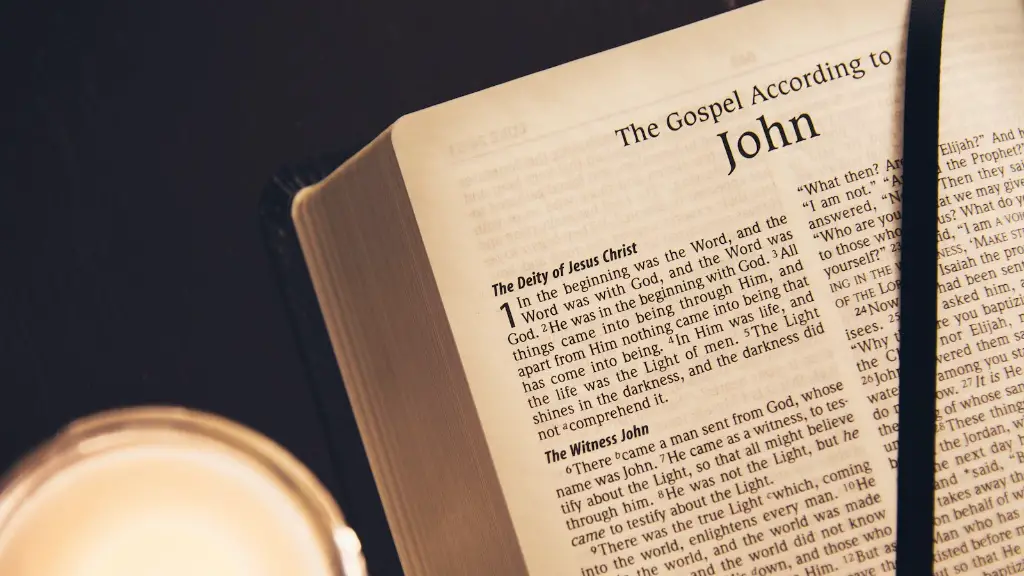Dreams have fascinated people for centuries, and their influence on faith and society is perhaps best described in the Bible, with numerous examples of how dreams were interpreted. From Pharaoh’s dream of seven fat cows and seven thin cows to Joseph’s dream of 11 sheaves of grain united, dreams are notable throughout the Bible. In fact, they are often viewed as divine messages. It is often thought that the interpretation of dreams was a major role in the very early Church.
The most significant interpreter in the Bible was Joseph. In Genesis 37: 5-11, Joseph recounts a dream he had where he was gathering sheaves of grain in the field with his brothers. They then bowed down to him, and Joseph quickly knew that the dream indicated his predominance over his brothers. In verse 11, there is a notable phrase “God’s interpretation is reliable.” This indicates that Joseph had a true understanding of the message God was conveying in the dream.
Joseph’s interpretation of dreams is just one example of dream interpretation in the Bible. While Joseph was the most prominent interpreter, dreams were also interpreted by other characters in the Bible. For instance, in Genesis 41, Pharaoh is having a dream of seven fat cows being devoured by seven thin cows — Joseph interprets the dream as seven years of plenty being followed by seven years of famine. Similarly, in Daniel 2, Nebuchadnezzar has a dream of a great statue which is interpreted by Daniel as a prophecy of four successive Gentile empires, signifying the course of human history on earth.
When considering the role of dreams in the Bible, it is important to note the importance of their interpretation. In many cases, dreams helped determine important social and political events, such as Joseph being appointed to oversee the storing of the grain during the famine. But the messages hidden in dreams were not always meant to foretell the future. Sometimes, they expressed the individual’s high innermost thoughts and desires — Egypt’s Pharaoh wanted recognition and power, and Joseph yearned for family harmony.
Interpreting dreams has been a phenomenon throughout history. The Bible serves as an example of how important the interpretation of dreams can be in shaping our understanding of life, society, and faith. As evidenced by the numerous stories contained in the Bible, the interpretation of dreams can provide invaluable insight into our understanding of the world around us.
Dreams of the Disciples
The Bible also mentions several instances of the disciples having dreams. In Acts 2:17, we see Peter having a dream where heaven opened and a voice said to him “You must tell this message to all people of every nation,” prompting him to preach the gospel to the gentiles. This dream changed the course of Christianity and showed the importance of dreaming in certain situations. Similarly, in Acts 10:10-17, Peter has a dream of unclean animals becoming clean, which symbolized how gentiles could become part of the Christian faith. These stories demonstrate how dreams can provide insight into the future and can lead us to fulfill our divine purpose.
In addition to providing insight, dreams can also be prophetic. For example, in Acts 16:9-10, a vision of a man from Macedonia appears to Paul in a dream and tells him to spread the gospel in that region. This dream encourages the spread of the Christianity, showing the power of dreaming. Similarly, in Genesis 46:2-4, Jacob has a dream about an angel ascending and descending a ladder, which foretells his destiny of becoming father of the twelve tribes of Israel. This dream also offers insight into God’s plan for Israel, emphasizing the dream’s divinity.
Dreams were significant to the disciples not only as a prophetic tool, but also as a source of direction and courage. In Acts 27, Paul has a dream to encourage his fellow travelers, who are in danger of being shipwrecked, to stay on the ship and sail to safety. This dream helps to restore their courage and encourages them to trust in God’s will. This dream provided both practical and spiritual guidance.
Interpreting Dreams with Symbology
Dream interpretation has a long history and has been used by various cultures to give meaning to their dreams. In the Bible, dreams are often interpreted by looking at their symbols. Symbology is the study of the hidden meaning of symbols found in dreams, which can help to uncover the dream’s deeper meaning. For instance, a dream of white robes may be interpreted as a message of peace and purity.
Interpreting dreams using symbols can help to understand the dreamer’s feelings and thoughts. Dreams can help us to see our goals in a new light and uncover our innermost desires and fears. In the Bible, symbols are often used to signify a deeper meaning. For example, the dream of seven fat cows and seven thin cows in Genesis 41 is interpreted as seven years of plenty followed by seven years of famine, but it can also be interpreted as a symbol for the unpredictability of life.
Symbolic interpretation of dreams is still widely practiced today, often by dream interpretation experts who can provide insight into the hidden messages behind a dream. By understanding the meaning of symbols, we can gain a deeper understanding of the dreamer’s inner thoughts and feelings. Symbology can help us connect to our innermost feelings and guide us on our spiritual journey.
Exploring Dreams with Psychoanalysts
In modern times, psychoanalysts often use dreams to gain insights into a person’s mind. Sigmund Freud, the founding father of psychoanalysis, famously believed that dreams were a way to “tap into” a person’s unconscious thoughts and feelings. This philosophy has continued to be widely accepted by psychoanalysts today who often use dreams to explore a person’s innermost emotions and provide valuable insight into their psyche.
Many modern psychoanalysts believe that there is no single answer to the question of dream interpretation, as the messages conveyed in dreams can have different meanings for different people. Instead, they emphasize the importance of examining a dreamer’s feelings and experiences to gain an understanding of the dream’s deeper meaning. In this way, dreams can be seen as powerful tools that can help us explore our innermost thoughts and provide insight into our emotions and behavior.
Dreams can be helpful in exploring our inner thoughts and providing insights into our emotional lives. While the meanings of our dreams can differ from person to person, the Bible is a great example of the power of dreams and their potential to help uncover the divine message hidden in our unconscious. By free-associating a dreamer’s thoughts and feelings, psychoanalysts are able to help dreamers explore their dreams and uncover their true meaning.
The Relationship Between Dreams and Reality
Dreams can often feel as real as our everyday lives, and in some cases, they may even be mistaken for reality. The Bible is no exception when it comes to dreams appearing to be reality — Joseph believes the vision sent by God to the Pharaoh was true, and Peter believes the vision sent by Jesus was true.
This relationship between dreams and reality is often explored by psychoanalysts, who view the dream world as a separate reality with its own set of rules and guidelines. Psychoanalysts believe that dreams act as a barrier between the conscious and unconscious worlds, and that in our dreams, we can act out our innermost desires without judgement or consequence. In this way, our dreams can allow us to explore our subconscious and gain insight into our emotional states.
Overall, dreams have been an important tool for people for centuries. From the Bible to modern psychoanalysts, dreams have been interpreted and used to provide insight into the divine, describe our innermost desires, and offer guidance in difficult times. By exploring the underlying symbols in a dream, we can gain an understanding of its hidden message and ultimately unlock a greater understanding of our emotional lives.
The Role of Dream Interpretation in Ancient Cultures
Dreaming and interpreting dreams were integral in many ancient cultures, including Babylonia, Assyria, and Egypt. The value of dreams in these cultures was evident in the various rituals and ceremonies that were performed while the dreamer was asleep. In the Bible, dream interpretation is seen as a divine tool, with various dreams in the Bible providing guidance, insight, and comfort.
The ancient Greeks and Romans also placed a great importance on dreams. They believed dreams to be prophetic and used them to gain insights into the future. In fact, the Roman writer Artemidorus Daldianus compiled and interpreted over 500 dream symbols in his book, Oneirocritica. The Romans held a festival in honor of the Goddess Diana and the priestess would interpret the dreams of those at the festival. This highlights the significance of dreams in ancient cultures, as they were seen as divine messages and revelations.
Dream interpretation has also been prominent in various other cultures. For example, in Chinese, Buddhist, and Hindu thought, dreams were believed to be a means of communicating with the gods. In the Islamic faith, dreams were seen as a way to receive divine guidance and blessings. In all of these cases, dreams were viewed not only as messages, but also as a means of understanding the divine.
Dreams in ancient cultures, such as those seen in the Bible, were seen as tools for communicating with the divine, offering insight, and providing guidance. This is still true today, as dreaming and dreaming interpretation are often used to gain an understanding of the innermost depths of the psyche and uncover our deepest desires.
Conclusion
Dreams have been a part of human culture since time immemorial. They have been used to both reflect and interpret the events of our lives and provide insight into the divine. The Bible is an excellent example of the importance of dreams in our lives and the power they can have in providing guidance, insight, and comfort. From Joseph’s interpretation of Pharaoh’s dream to Peter’s dream of Jesus speaking to him, the Bible clearly emphasizes the power of dreams. In the modern era, psychoanalysts use dreams to gain an understanding of the dreamer’s psyche and uncover their innermost desires and fears. By understanding the symbols hidden in dreams, we can gain an understanding of the deeper meaning behind them and gain insights into our emotional lives. In this way, dreams can help to connect us to the divine and provide invaluable guidance in life.





